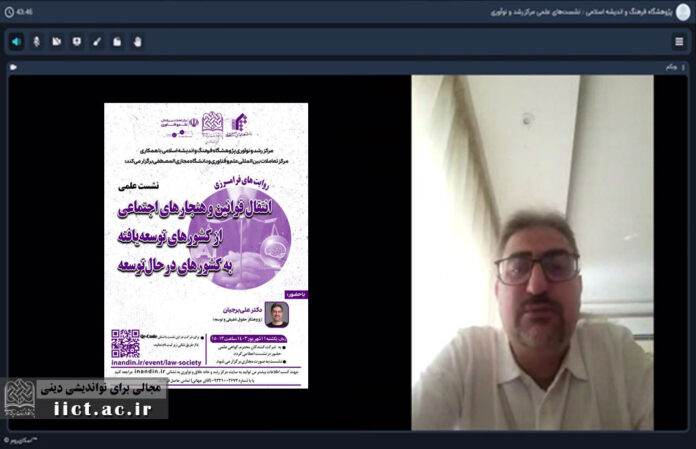According to the Public Relations Office of IICT, the cross-border narratives session titled “Transfer of Laws and Social Norms from Developed to Developing Countries,” presented by Dr. Ali Borjian (Comparative and Developmental Law Researcher), was held on Sunday, September 1, 2024, hosted by the Institute’s Growth and Innovation Center in collaboration with the International Scientific and Technological Cooperation Development Organization of the Presidency.
This presentation was based on Dr. Borjian’s doctoral dissertation, which is divided into two parts: the first part concerns the methodology of comparative law and its contribution to development, while the second part addresses the history of Iranian law. Comparative law essentially involves comparing the legal progress rates of different countries. Territorial occupations led to fundamental changes in countries, followed by modernization. The first model is the natural model, where Christian laws were enacted in Parliament.
The second model, known as the elective and free model, involves the voluntary transfer of laws to other countries. This model was welcomed for its efficiency and the utilization of specialized experiences. Legal migration can involve legal institutions, judicial structures, or rules and regulations. This migration started in ancient Greece, but the earliest recorded instance is from the Hammurabi tablets in ancient Rome. In Iran, during the Achaemenid period, trade laws from Hammurabi’s code were used. These models evolved over time into Common Law and Roman-Germanic (French) law.
American professor Alan Watson was the first to emphasize the legal legitimacy of transferring laws from developed to developing countries in comparative law. Watson’s critics are of two types: rationalists who consider foreign elements disruptive to coherence, and culturalists led by Pierre Legrand. Legrand presents three main arguments against Watson, including the idea that every legal package is tied to its own epistemology and social and cultural context, which is lost in the transfer. Watson argues that law and legal systems are like technology that can be transferred regardless of social and cultural conditions. Watson believes that comparative lawyers should be able to best integrate and identify foreign laws within their own legal system. The more open the importing legal system is, the greater the potential for legal progress and development.
Watson argues that elites and societal leaders often emulate foreign laws without necessarily considering social benefits or public good, instead prioritizing their own interests. Nevertheless, Watson’s theories have been influential. Since 1986, Watson’s ideas have spread to other countries. His theories influenced legislation in East Asia and South America, and post-Soviet Eastern European countries seeking to align with the West were also affected by his ideas.
Critical theory emerged in the 1990s as a synthesis of Watson and his critics. This theory emphasizes that Watson’s claim of separating culture and law is unrealistic, and that legal systems are indeed dependent on cultural contexts, although the transfer of experiences and laws cannot be deemed impossible. Cooter and Merkel provided sociological analyses of Watson’s theories. In 2010, one scholar defined mixed systems as an independent legal system at the eighteenth International Conference on Comparative Law.
It is essential to consider the historical and cultural contexts of a region when transferring legal rules, norms, and social regulations.




